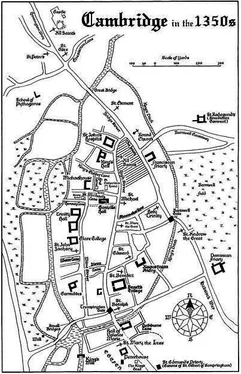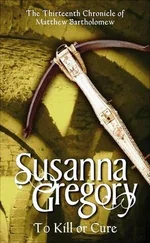‘He was being a fool,’ said Michael disparagingly. ‘He allowed Philippa to borrow his cloak and that silly feathered hat without asking why. All this relates to your observation about distinguishing features – you said a really prominent characteristic will mask all else, and Philippa used Giles’s hat to do just that. Harysone knew about distinguishing features, too, and adopted those teeth. His disguise fooled his kinsmen, as well as Giles. It was a pity Philippa was not more skilled in the use of her dagger. If she had stabbed Harysone properly, then he would not have dragged his cousin to a watery grave or locked me in a damp cellar for so many hours.’
‘Matilde was right and wrong, too. She knew there was something sad about Philippa, which was correct, but it had nothing to do with love, as she surmised.’
‘And we were definitely wrong about Dunstan and Athelbald,’ said Michael, chuckling fondly. ‘I still cannot believe they were so deeply involved in the case. The old devils! Still, it is good they had the last laugh. I shall miss them.’
‘So shall I,’ said Bartholomew quietly.
Michael nudged him in the ribs, wanting to dispel the sudden pall of gloom that had descended on them. ‘There is another thing: I know the identity of the rogue who fashioned that wicked but very clever model of William out of marchpane.’
‘You do?’ asked Bartholomew uneasily.
‘Oh, yes. There is only one man in the College who has a talent for drawing and other artistry, and a pair of skilled hands.’
‘I see,’ said Bartholomew, smiling. ‘However, I did not know the thing was disguised under all those veils purporting to be the Virgin, nor that the marchpane was made from salt, so do not blame me for either of those.’
‘You must have known about the salt,’ said Michael in disbelief. ‘Do not tell me you did not take a bite when you were labouring over those details!’
‘I am not you, Brother. Gorging myself on the marchpane Gray provided for his prank did not cross my mind. Supposing there was not enough to finish it properly?’
Both scholars looked up when the latch on the orchard gate clanked, heralding the arrival of someone else. It was Philippa, leaning on her brother’s arm and escorted by Cynric. Unfortunately, the sudden thaw had confounded the embalmer’s calculations, and the resulting problems with Turke’s body had kept her and Abigny in Cambridge longer than they had intended.
‘We have come to say our farewells at last,’ said Abigny, leaning against the wall. He was smiling, and Bartholomew saw again the carefree young man with whom he had once shared a room. A great weight had been lifted from Abigny. ‘We are going to Walsingham, to complete our pilgrimage. Personally, I would be just as happy to go home, but northward we shall venture.’
‘What about Turke?’ asked Michael baldly. ‘Will you leave him here while he rots?’
Philippa winced. ‘I wanted to take him with us. It was his pilgrimage, after all, and I think he needs to complete it. But the embalmer says he will not last, so we have compromised.’ She held a small box in her hands, which she passed to Bartholomew.
‘What is it?’ It was heavily sealed, so he could not open it.
‘Walter’s heart. We will carry it to Walsingham and leave it there. Meanwhile, young Quenhyth is going home to make peace with his father over the misunderstanding with the Waits and the chalice he accused them of stealing. He has offered to accompany the rest of Walter to Chepe. It is very kind of him.’
‘Very,’ said Bartholomew, shoving the box back at her with some distaste. ‘Quenhyth will take good care of Walter. The lad has his faults, but unreliability and carelessness are not among them.’
She turned to Michael. ‘When I return home, I shall send funds from my inheritance that will help to establish a new Dympna.’
‘All right,’ said Michael warily. ‘Although I am not sure we need another of those.’
‘It will be safe in the hands of good men,’ said Philippa.
‘Ailred was a good man,’ Bartholomew pointed out.
Abigny pointed to the sky, and took his sister’s arm. ‘We should go, or we shall have to delay our departure until tomorrow – and I am certain Edith and Oswald want us gone.’
‘Edith has offered us her home when we return from Walsingham,’ said Philippa shyly. She glanced at Bartholomew. ‘When I come back, with all stains of these horrible events wiped from my conscience, perhaps I could stay a while in Cambridge, and you and I could resume our friendship Perhaps where we left off, all those years ago?’
Bartholomew smiled. ‘It is a tempting offer, but we have both changed over the years. Although I shall always remember you with affection, my heart belongs to another.’
‘That is a shame,’ said Philippa, disappointed. ‘But I wish you happiness nonetheless. Do not spurn her because she is poor, and make the mistake I made.’
‘I will not,’ promised Bartholomew.
The huge drift of snow outside Bene’t College did not thaw as quickly as was hoped, but attacking it with shovels proved to be hard and futile work, so the citizens of Cambridge were obliged to let it melt in its own time. It did so gradually, and people commented on its slowly diminishing size when they passed it on the High Street. Children played on it, using its slick sides for sliding, while some enterprising souls caused a good deal of delight by carving faces into it. Morice’s was one that was prominently featured, and Agatha’s was another.
Weeks passed, until eventually it dwindled to the point where people barely noticed it was there. Then, one morning, only the very base remained. It was Kenyngham who discovered its grisly secret. He was walking from Michaelhouse to his friary when he saw the hand of the long-dead Josse protruding from it. He knelt, sketching a benediction and muttering prayers for the soul of a man who had lain unmissed and undiscovered for so long. There was a piece of parchment clutched in Josse’s hand. Kenyngham removed it from the dead, white fingers, and read the message.
It was from John Fiscurtune the younger to Ailred, and informed the friar of the imminent visit of his nephew and his ‘plan’ to relieve Turke of more money. Kenyngham recalled the events that had unfolded that Christmas with a shudder. He folded the parchment carefully, and put it in his scrip, intending to hand it to Michael later. But first, there was a man’s soul to pray for, and Kenyngham lost himself in the sacred words of a requiem for a man he had never met.
Sheriff Tulyet tried hard to discover the dead man’s identity, but Josse had carried nothing to give him any clues, and a week later he was buried in an unmarked grave in a quiet corner of St Botolph’s churchyard. Quenhyth, recently returned from delivering Turke’s body to Chepe, heaved a sigh of relief. He had been afraid that someone clever, like Michael or Bartholomew, would tie the time of Josse’s death to one of the days that Quenhyth had slipped out of Michaelhouse and had gone to the King’s Head. Gray had told Quenhyth on two occasions that someone there had a note from his father, but both times the summons had transpired to be a cruel joke that had seen Quenhyth fined by William for being in a tavern. In normal circumstances, Quenhyth would have ignored Gray’s message, but he had left home on bad terms with his family, and he had so desperately wanted them to write and tell him that all was forgiven.
Quenhyth recalled the day vividly. It had been after dusk, and the streets were deserted as he had struggled through the blizzard to the inn. When he had seen Josse, he had stopped dead in his tracks and stared in disbelief. It was the man who had stolen away his lovely Bess and broken his young heart: Josse was older and more handsome, and the fickle tavern wench had abandoned Quenhyth for the sturdy messenger without a backward glance. To soothe his hurt, Quenhyth had decided to give up his apprenticeship as a fishmonger and become a physician instead, wanting to change every aspect of his unhappy life.
Читать дальше












